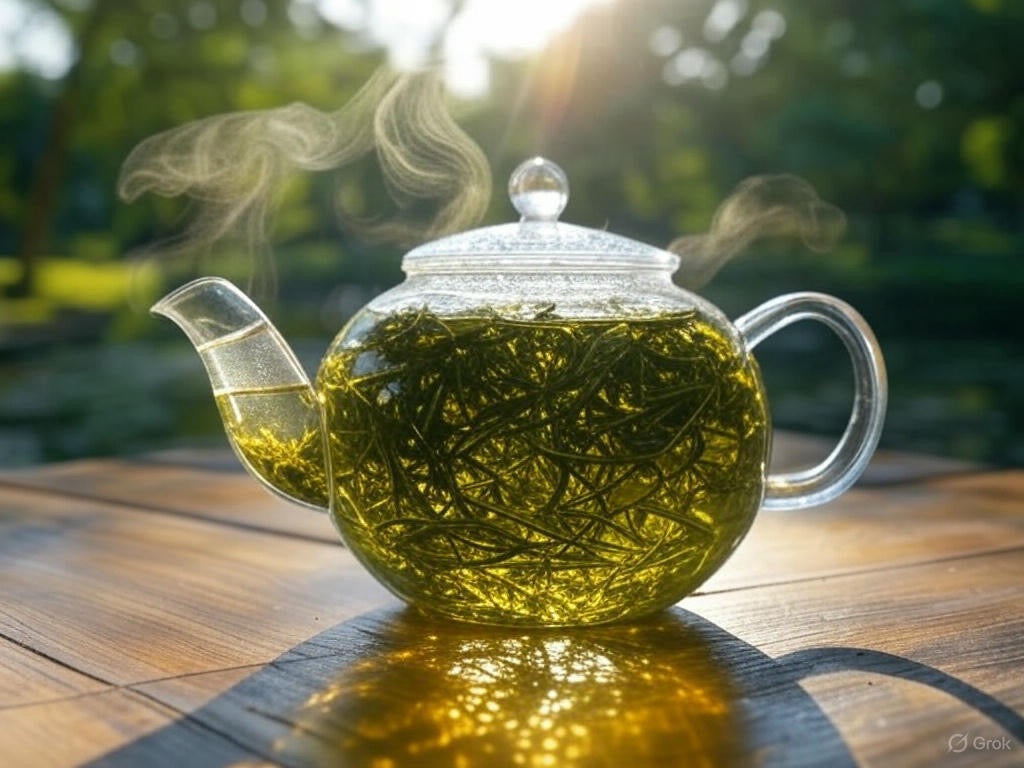
Green tea and better mental health
Share
The Long-Term Power of Green Tea: A Boost for Mental Health in Middle-Aged and Older Men
Green tea has long been celebrated as a powerhouse of health benefits, from boosting metabolism to supporting heart health. But a new study published in 2025 offers fresh insight into how sipping this ancient beverage over the long term might protect the mental well-being of middle-aged and older men. The secret? It’s all about taming inflammation.
The Study: A Closer Look
Researchers in China recently explored how consistent green tea consumption impacts mental health, focusing on men in their middle and later years—a group often at higher risk for depression. The study compared two groups: one that regularly drank green tea and a control group that didn’t. Over time, they tracked factors like depression levels, sleep quality, and even brain structure using tools like MRI scans. The results? Green tea drinkers came out on top in some surprising ways.
Inflammation: The Hidden Culprit
Inflammation isn’t just about swollen joints or a sore throat—it’s a sneaky player in mental health too. Chronic inflammation in the body can mess with mood, sleep, and even brain function, raising the risk of depression. Middle-aged and older men, who often face hormonal shifts like declining testosterone, can be especially vulnerable. But here’s where green tea steps in. Packed with bioactive compounds like catechins (think EGCG, the rockstar antioxidant), green tea seems to dial down systemic inflammation, creating a ripple effect of benefits.
What They Found
The tea-drinking group showed lower levels of depression compared to their non-tea-drinking peers. They also slept better, with less severe insomnia—a big deal, since poor sleep can fuel a downward spiral in mental health. Digging deeper, the researchers found that green tea drinkers had higher testosterone levels, which might help explain the mood boost. Even their brain scans told a story: the tea group had more gray matter volume in a key area called the precuneus, linked to memory and emotional processing, while the control group showed signs of shrinkage.
And it’s not just about the brain. The tea drinkers had lower body mass index (BMI) scores, suggesting green tea might help keep weight in check—an added perk that could ease physical and mental strain as we age.
Why Green Tea?
So, what’s the magic behind these findings? Green tea’s natural compounds don’t just fight inflammation—they also support the body’s hormonal balance and protect brain cells. By reducing inflammation markers, green tea may lower the stress on both body and mind. Better sleep and higher testosterone could amplify this effect, creating a shield against the mental health challenges that often creep up with age.
How Much Should You Drink?
The study didn’t specify an exact daily dose, but it’s clear that consistency matters. Other research suggests 2–4 cups a day is a sweet spot for most people, depending on your caffeine tolerance. Too much might jitter you up or, in rare cases, strain your liver, so moderation is key. Brew it fresh for maximum potency—those antioxidants lose their punch in stale powders or over-steeped bags.
A Sip Toward a Healthier Future
This study isn’t saying green tea is a cure-all. Lifestyle factors like diet, exercise, and social connections still play huge roles in mental health. But it’s exciting to think that something as simple as a daily cup (or three) of green tea could offer middle-aged and older men a leg up against depression and cognitive decline. Plus, it’s affordable, widely available, and let’s be honest—pretty enjoyable.
So, next time you’re brewing a pot, raise your mug to this: green tea might just be a small, steady step toward keeping your mind sharp and your spirits high as the years roll on. What do you think—ready to make it a habit?
Link to the study:
https://pubmed.ncbi.nlm.nih.gov/40071113/